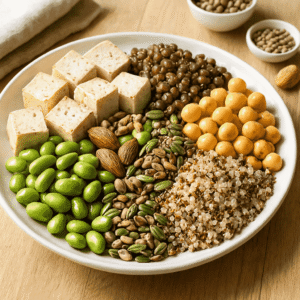Introduction
Carbohydrates are one of the three macronutrients essential for human survival, alongside proteins and fats. They are the body’s primary energy source and play a crucial role in overall health. But with so much debate about good vs. bad carbs, it’s important to understand their true impact on our bodies.
Types of Carbohydrates
Simple Carbohydrates
Simple carbs are quickly digested and provide instant energy. These include:
- Sugar in fruits (fructose)
- Milk sugar (lactose)
- Table sugar (sucrose)
Complex Carbohydrates
Complex carbs are digested slowly, providing sustained energy. Examples include:
- Whole grains (brown rice, oats, quinoa)
- Legumes (lentils, beans, chickpeas)
- Starchy vegetables (sweet potatoes, corn)
Dietary Fiber
Fiber is essential for digestion and gut health. It helps regulate blood sugar levels and keeps you feeling full longer.
Functions of Carbohydrates
- Energy Production – Carbs are broken down into glucose, the body’s preferred fuel source.
- Brain Function – The brain relies on glucose for optimal cognitive performance.
- Muscle Recovery – Carbs help replenish glycogen stores after exercise.
Sources of Carbohydrates
Natural Sources:
- Fruits (apples, bananas, berries)
- Vegetables (carrots, spinach, broccoli)
- Whole grains (oats, whole wheat, brown rice)
Processed Sources:
- White bread
- Sugary cereals
- Soda and candy
Good Carbs vs. Bad Carbs
Good carbs come from whole, unprocessed foods rich in fiber and nutrients. Bad carbs are often refined, stripped of fiber, and lead to spikes in blood sugar.
Carbohydrates and Weight Management
Despite the myth, carbohydrates do not directly cause weight gain. Overeating and poor food choices are the real culprits. Choosing whole, fiber-rich carbs supports a healthy weight.
Carbohydrates and Physical Performance
Athletes rely on carbohydrates for sustained energy. Carb-loading before endurance events helps maintain glycogen stores for prolonged physical activity.
Carbohydrates and Blood Sugar Levels
Understanding the glycemic index (GI) helps determine how quickly a carbohydrate raises blood sugar levels. Low-GI foods (whole grains, legumes) provide steady energy, while high-GI foods (white bread, candy) cause rapid spikes.
Low-Carb Diets and Their Impact
Low-carb diets like keto restrict carbohydrate intake and rely on fat for energy. While they can aid in weight loss, they may not be sustainable for long-term health.
How to Incorporate Healthy Carbs into Your Diet
- Choose whole grains over refined grains.
- Eat a variety of fruits and vegetables.
- Include legumes for fiber and protein.
Debunking Common Myths About Carbohydrates
- Myth: All carbs are bad. Truth: Whole carbs are essential for health.
- Myth: Carbs make you fat. Truth: Excess calories, not carbs, cause weight gain.
Carbohydrates and Gut Health
Fiber-rich carbohydrates promote digestion and support gut bacteria, which play a role in immunity and overall well-being.
Carbohydrates and Chronic Diseases
While excessive sugar consumption is linked to diabetes and heart disease, whole carbohydrates help reduce the risk of chronic conditions.
How Much Carbohydrate Do You Need Daily?
The recommended daily intake varies by individual, but a balanced diet should include 45-65% of daily calories from carbohydrates.
Conclusion
Carbohydrates are essential for energy, brain function, and overall health. Choosing the right carbs—whole, fiber-rich, and unprocessed—supports a balanced and healthy lifestyle.
FAQs
1. Are all carbohydrates unhealthy?
No, whole-food carbohydrates like fruits, vegetables, and whole grains are highly nutritious and beneficial.
2. Can I eat carbs and still lose weight?
Yes! Choosing fiber-rich, whole carbohydrates and managing portions can support weight loss.
3. What are the best carbs for muscle building?
Oats, brown rice, sweet potatoes, and quinoa provide sustained energy for muscle growth and recovery.
4. How do carbohydrates affect blood sugar levels?
Refined carbs cause quick spikes in blood sugar, while complex carbs provide steady energy release.
5. Should I avoid carbs if I have diabetes?
Not necessarily. Focusing on low-GI carbs and fiber-rich foods helps manage blood sugar effectively.




